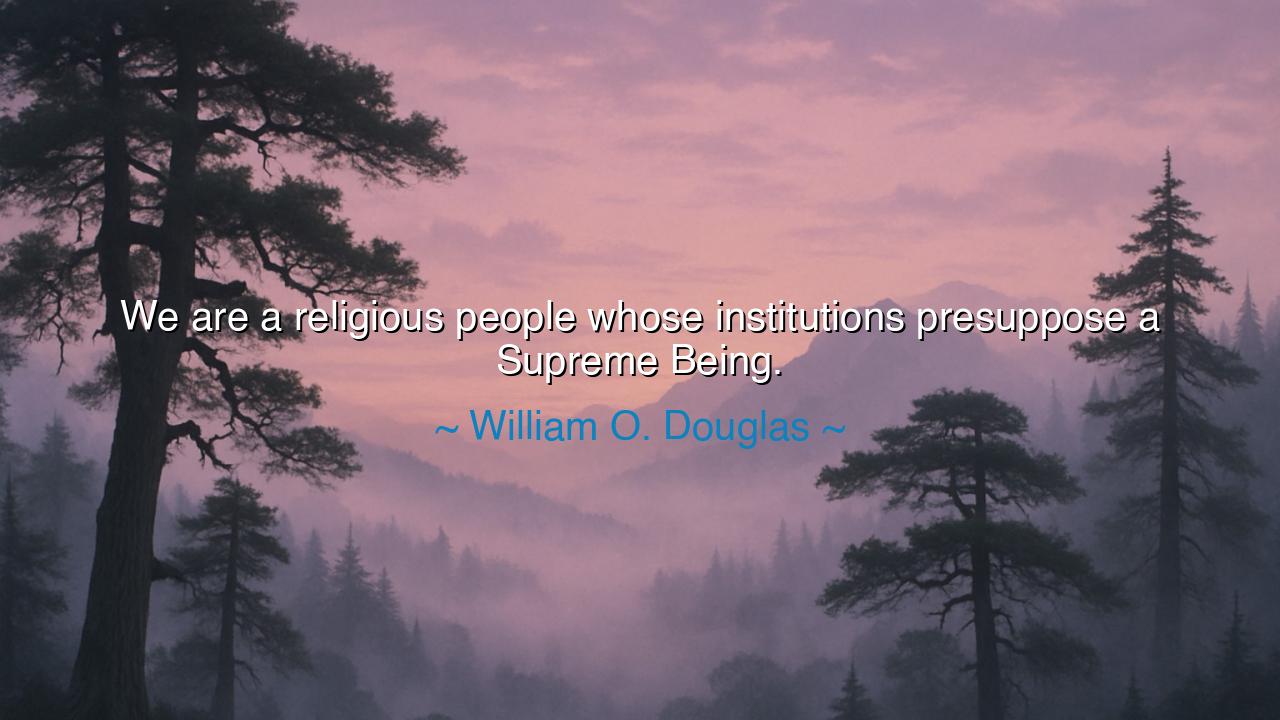
We are a religious people whose institutions presuppose a Supreme






“We are a religious people whose institutions presuppose a Supreme Being,” declared William O. Douglas, a Justice of the United States Supreme Court, in his 1952 opinion for Zorach v. Clauson. These words, though uttered in the language of law, resound with a tone older and deeper than jurisprudence — the tone of a civilization speaking to its own soul. In this declaration, Douglas did not call for sectarianism or dogma; he spoke of a truth woven into the fabric of the nation’s spirit — that the human heart, and the institutions it builds, are shaped by an awareness of the divine, a sense that above human law stands a higher moral order.
The origin of the quote emerges from one of the most profound legal debates in American history — the relationship between faith and freedom. In Zorach v. Clauson, the Court upheld a program allowing students to leave public school during the day to attend religious instruction. Douglas, writing for the majority, reminded the nation that the Constitution does not require hostility to religion. His words — “We are a religious people” — were not a call to any particular creed, but a recognition that the moral and spiritual traditions of the people had given rise to the nation’s laws, its sense of justice, and its belief in human dignity. For without some acknowledgment of the Supreme Being, the source of conscience and right, all laws become mere machinery, and all rights mere privilege.
Douglas was echoing what the ancients knew and what every free people must remember: that freedom and morality cannot exist without a foundation beyond themselves. The Greeks spoke of the Logos — divine reason ordering the cosmos. The Founding Fathers of America, in turn, spoke of “Nature’s God” and of truths “endowed by their Creator.” These were not the inventions of religion, but the recognition of an eternal reality — that man, to be free, must be accountable to something higher than his own will. The institutions of justice, charity, and liberty are not the fruits of skepticism, but of reverence — a reverence that sees in every human being a spark of the divine.
History offers abundant witness to this truth. Consider George Washington, who, in his first inaugural address, knelt before the Almighty and declared that the nation’s success depended upon the “benign Parent of the human race.” Washington knew that political freedom without moral discipline leads to corruption, and that moral discipline without faith withers into emptiness. Likewise, when Abraham Lincoln faced the horrors of civil war, he did not turn to ideology or pride, but to prayer. In the midst of bloodshed, he said, “Both sides read the same Bible and pray to the same God, and each invokes His aid against the other… The Almighty has His own purposes.” Even in conflict, Lincoln recognized the higher hand guiding the destiny of nations. Such was the humility that Douglas invoked — not a state religion, but a religious people, aware of something greater than themselves.
When Douglas spoke of institutions that “presuppose a Supreme Being,” he was not speaking of altars or rituals, but of principles. Justice presupposes a moral lawgiver; liberty presupposes a Creator who made man free; compassion presupposes the divine spark in every heart. A courthouse inscribed with the Ten Commandments, a coin engraved with “In God We Trust,” or a pledge declaring “one nation under God” — these are not symbols of domination, but of remembrance. They are the nation’s way of affirming that law must serve more than power, that human dignity flows from something eternal. To erase that foundation is to forget why freedom matters at all.
And yet, Douglas’s insight is not merely for one nation, but for all of humanity. For every civilization, ancient or modern, that has endured, has done so because it honored the sacred — the unseen measure of the seen. When civilizations deny the divine, they lose their soul; when they exalt man as god, they crumble beneath the weight of their arrogance. From Rome’s decline to the wars of the twentieth century, history bears witness: a people who lose reverence soon lose restraint, and those who lose restraint soon lose peace.
So, dear listener, what lesson shall we draw from Douglas’s words? It is this: remember the sacred in all that you build. Whether you stand in a courtroom or a classroom, in a home or in a field, remember that your freedom, your reason, your compassion — all these are reflections of something greater. You need not name it the same as your neighbor; you need only recognize that life is not an accident, and goodness is not a mere invention. Live with reverence. Govern with humility. Create with conscience.
For as William O. Douglas reminds us, the strength of a people lies not in their wealth or weapons, but in their spiritual awareness — their knowledge that above all empires, above all human laws, there is an eternal Supreme Being who watches, who endures, and who calls the human soul to rise. And when we remember this truth, our institutions do not merely rule — they serve; our freedom does not merely exist — it endures.






AAdministratorAdministrator
Welcome, honored guests. Please leave a comment, we will respond soon